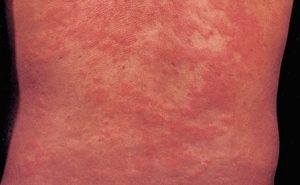Milk Allergy
Milk Allergy
Most frequent type of allergy in which body abnormally responds to milk and related products. Most commonly seen in young children. Allergic reaction occurs instantly after consuming milk. Buffalo milk, cow milk, goat and sheep milk all can induce reaction.
Symptoms
Symptoms arises within short interval of time after consumption of milk. Symptoms include;
- Hives
- Swollen lips, face and tongue.
- Wheezing
- Tingling and itching sensation in the lips and mouth.
- Coughing and difficulty in breathing.
- After sometimes abdominal pain, loose motion.
- Runny nose and eyes.
- Colic, In babies.
Causes
In milk allergy body produces antibodies like IgE in response to the milk proteins that act as allergens. Antibodies then neutralizes the allergens. After another exposure sensitize antibodies releases histamine which causes signs and symptoms. There are two important proteins in the milk of cow that causes allergy; casein and whey. Sometimes milk can trigger allergic response after hours known as delays food allergy and Food protein-induced enterocolitis syndrome (FPIES) presenting as vomiting and diarrhea. It can resolve on its own overtime.
Complications
Diagnosis
- Detailed history.
- Complete general physical examination.
- Skin test. This test is not fully accurate.
- Blood test to rule out milk allergy after indicating antibodies against milk protein in the blood.
Treatment
The only technique to prevent consuming milk and milk products. Medications like antihistamines can be beneficial for mild reaction. However, for severe reaction like anaphylaxis injectable epinephrine or epinephrine shots are the only treatment.
